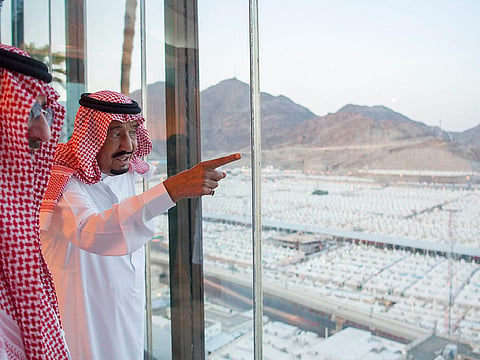King Salman rejects politicisation of Haj
King Salman stresses importance of Muslim unity to eradicate fanaticism

Manama: Saudi King Salman Bin Abdul Aziz Al Saud said the kingdom categorically rejected the association of Haj with politics or sectarianism.
“Saudi Arabia firmly rejects that this great ritual is used to achieve political goals or sectarian divergences differences, especially that God has called upon all Muslims to perform pilgrimage without discrimination,” King Salman said.
“Fanaticism and extremism are rejected religiously and logically. Whenever they creep into the body of the Islamic nation, they spoil its cohesion, future and image in the world. The only way to get rid of this scourge is to eradicate it unabatedly and through the unity of Muslims,” King Salman said as he addressed the heads of state, VIPs, Saudi state Haj guests and heads of delegations who were performing Haj this year.
The Saudi monarch insisted on the importance of unity among Muslims as they faced challenges and sought solutions.
“Islam is a religion of peace, justice, brotherhood, love, and benevolence. The conflicts, tragedies and divisions in some parts of the Islamic nation today should motivate all of us to make every effort to unify our stances and strengthen our rank. We must work together to settle the conflicts and end the divergences, and the Kingdom confirms its steady desire to unite Muslims, extend a helping hand to them, and work to support all the good efforts that seek to achieve the interests of the Muslim countries,” he said.
All physically fit and financially able adult Muslims are required to perform Haj at least once in their lives.
The pilgrimage this year started on Saturday when pilgrims converged in the tent city of Mina in the outskirts of Makkah.
On Sunday, they headed to Mount Arafat where they spend the day in prayers and supplications.
Pilgrims on Monday headed to Makkah before returning to Mina for another two days of prayers and supplications. The rituals include the symbolic stoning of the devil.
Away from Makkah, Iran was the only country not to allow its citizens to perform Haj this year to protest Saudi Arabia’s refusal to fulfil Iranian requests for special practices during the pilgrimage season.
Tehran’s stance meant that the only Iranians who performed Haj this year were the ones who applied for Saudi visas from other countries, mainly in the West.
Sign up for the Daily Briefing
Get the latest news and updates straight to your inbox



